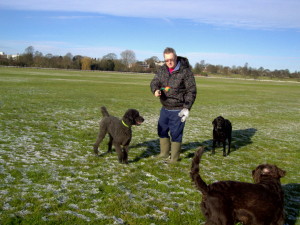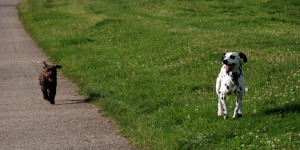Dog Parks and Off-Lead Dogs.
Dog parks are popular places for dog owners to go in the U.S. so they can let their dogs off in a securely fenced off open space. Generally, these parks are in cities, but they are not always huge facilities and over crowding can often occur. Thankfully, such dog parks do not exist officially – (as far as we are aware) – in the U.K. However, there are many other un-official spaces in every community where people meet to let their dogs run free. This sounds ideal, but is it? Holidays4Dogs investigates the issues of open spaces where lots of dog walkers gather with off-lead dogs.
Socialisation.
It would seem logical that dogs should have the chance to run free naturally with other dogs. Indeed, many dog owners believe this is an essential activity for their pet. However, this can only be successful if all the dogs in question are well socialised and under control by responsible owners.
This is why our approved Holidays4Dogs carers only allow off-lead exercise for clients who have authorised this this, because of the extra responsibility and potential risk involved.
The problem comes when the intermingling of strange dogs – typically three, or more – can create conflict. There may be bullying behaviour occurring that many dog owners don’t see. As a result, scuffles, or even serious fights can break out.
There is nothing nicer for well matched dogs to play together, but dog parks and other open spaces, attract many irresponsible owners who simply allow their dogs to let off steam, unsupervised.
Although there are no official dog parks here in the U.K there are many places across the country which are frequented by dog walkers. Open spaces and urban recreation grounds often have many dogs at any one time, being exercised off-lead.
Evaluating the situation.
The discerning dog owner might have some preliminary thoughts about off-lead play among large numbers of strange dogs. For example – How friendly are the other dogs? Are the other dogs under complete control? How far away are the owners and are they taking notice of their dogs?
Walking my own dogs at one particular open space frequented by local dogs and their owners (which I now avoid!), it was common to see conflict. Unfortunately, this was not only between dogs, but arguments ensued between disgruntled dog owners. This was frequently due to dog-to-dog aggression between one, or more dogs. People have different opinions about what is normal dog behaviour and things can quickly become heated, regarding which dog – or owner – is at fault.
Familiar territory.
The problem is often compounded because local open spaces are used by the same dogs and dog walkers every day. This means a dog will often view the area as its own personal territory.
While they may be fine getting to know and meeting the same few dogs at the same time of day, a newcomer may be subject to territorial aggression.
Sometimes, in environments where dogs are running off-lead with no control from their owners, they actually learn how to be good fighters. This is often the case in large dog parks in the U.S.
It is almost impossible to know how another dog is going to react with your dog. Every breed has the potential to be a bully, even small and toy breeds.
The fact is, when large numbers of dogs get together there must be supervision from responsible owners.
Before a dog is allowed to go to a canine crèche, for example, it is behaviour and temperament is tested for suitability. Introductions are skilfully managed by people qualified in dog behaviour, or training. Likewise, all existing dogs owned by our Holidays4Dogs carers are evaluated for their sociability before being approved.
Understand your dog’s behaviour.
Unfortunately, there are a number of irresponsible owners who will allow their dogs to be off-lead and out of control, many of them clearly with aggressive tendencies. Owners often appear totally ignorant of their dog’s, (predatory), behaviour. Sometimes, owners claim their dogs are ‘friendly’ when they are nothing of the sort.
Dog walking etiquette.
It is always sensible to be cautious when exercising your dog in places where you know lots of dogs run free. While meeting up with a group of known dogs and owners is great for both you and your dog, be wary of loose dogs in open spaces and dog parks. This is especially so if there are two, or more, with different owners.
If in doubt, always put your dog on the lead. It is unfair to expect the dogs to ‘work it out for themselves’ – this may involve aggression, or injury.
If your dog is naturally shy, or nervous, forcing him to meet lots of dogs, especially if there is more than one, is more likely to make the problem worse. It is often impossible to know how other dogs are going to react.
Repeated unpleasant experiences with bully dogs, may encourage your dog to react aggressively. Alternatively, it can make a shy dog much more anxious and frightened. (Check out our other Holidays4Dogs article, ‘Helping the Nervous Dog’ or ‘Dogs that need Space‘).
Conclusion.
As long as every dog owner acts in a responsible manner, off-lead play and socialisation is good for dogs. While dog parks and open spaces can be enriching for dogs, there are things to be aware of.
The reality is, you never know how other dogs, or their owners are going to react. Especially if this involves several dogs. It is absolutely fine for dogs to socialise and interact. However, always be cautious of large groups of dogs and try to be aware of the behaviour of your own dog and others they are likely to meet.





